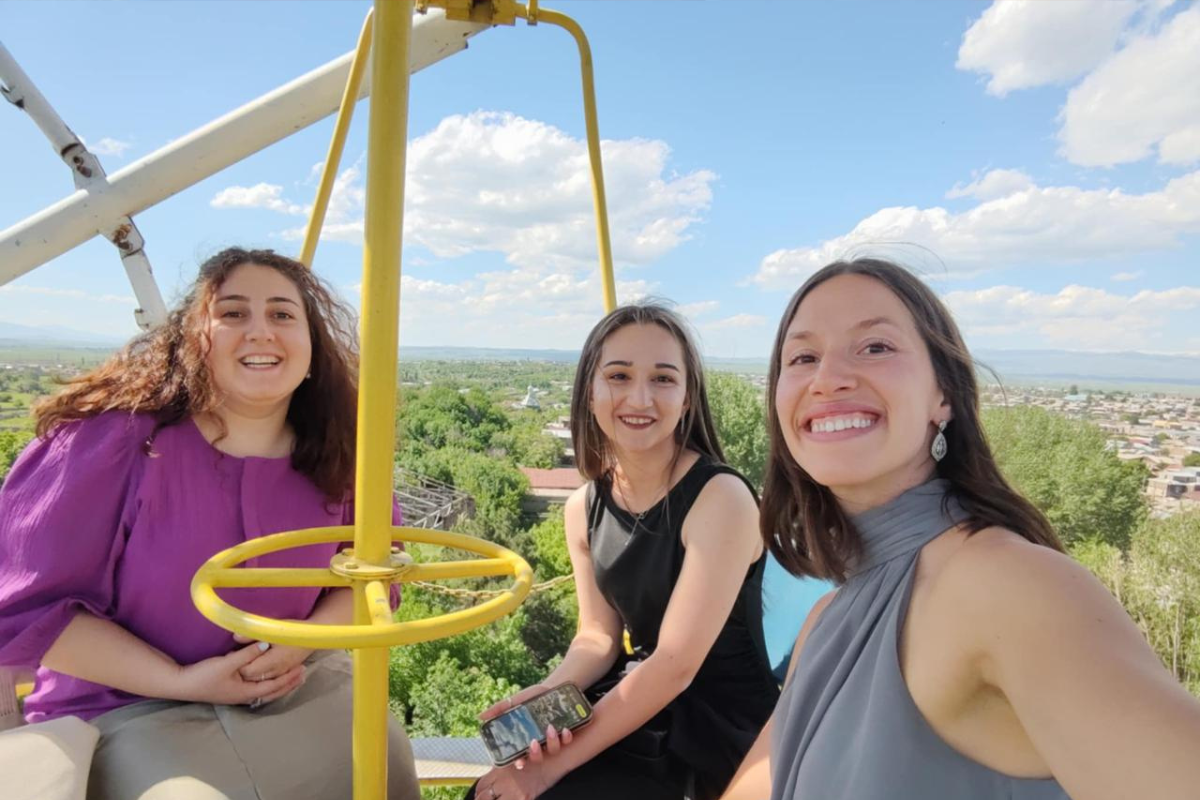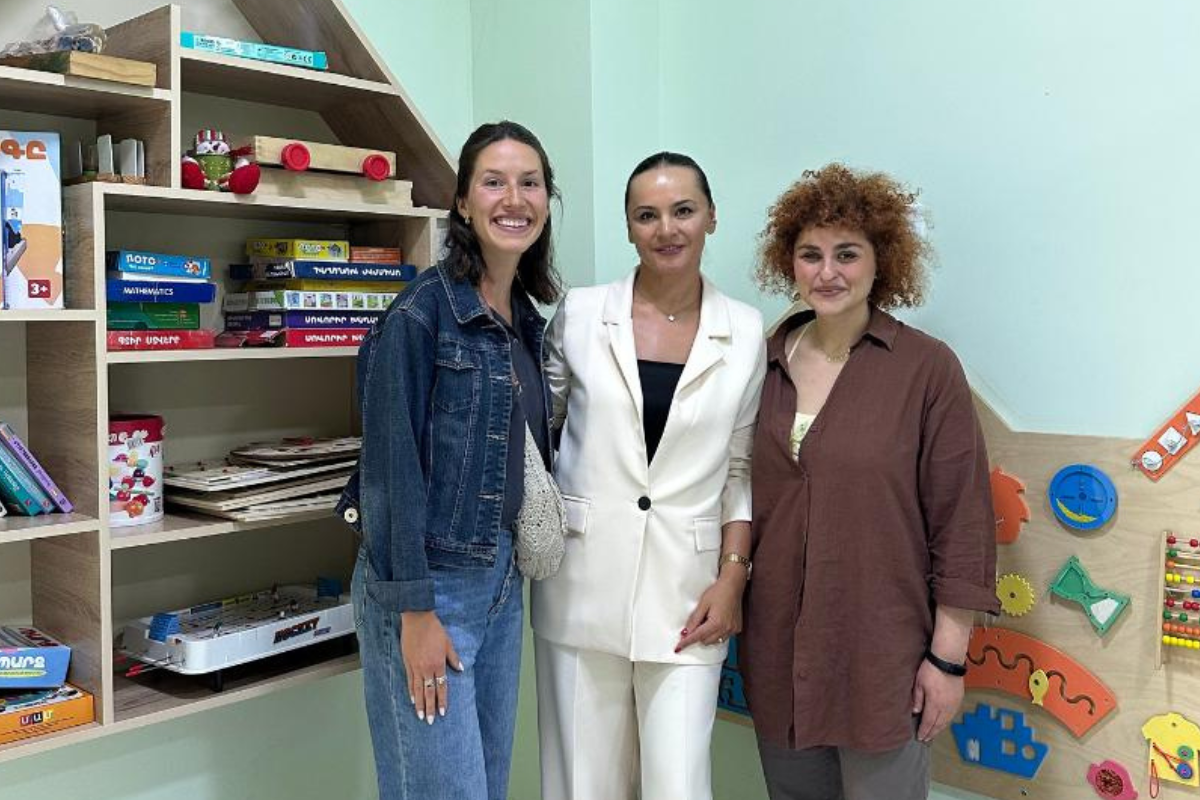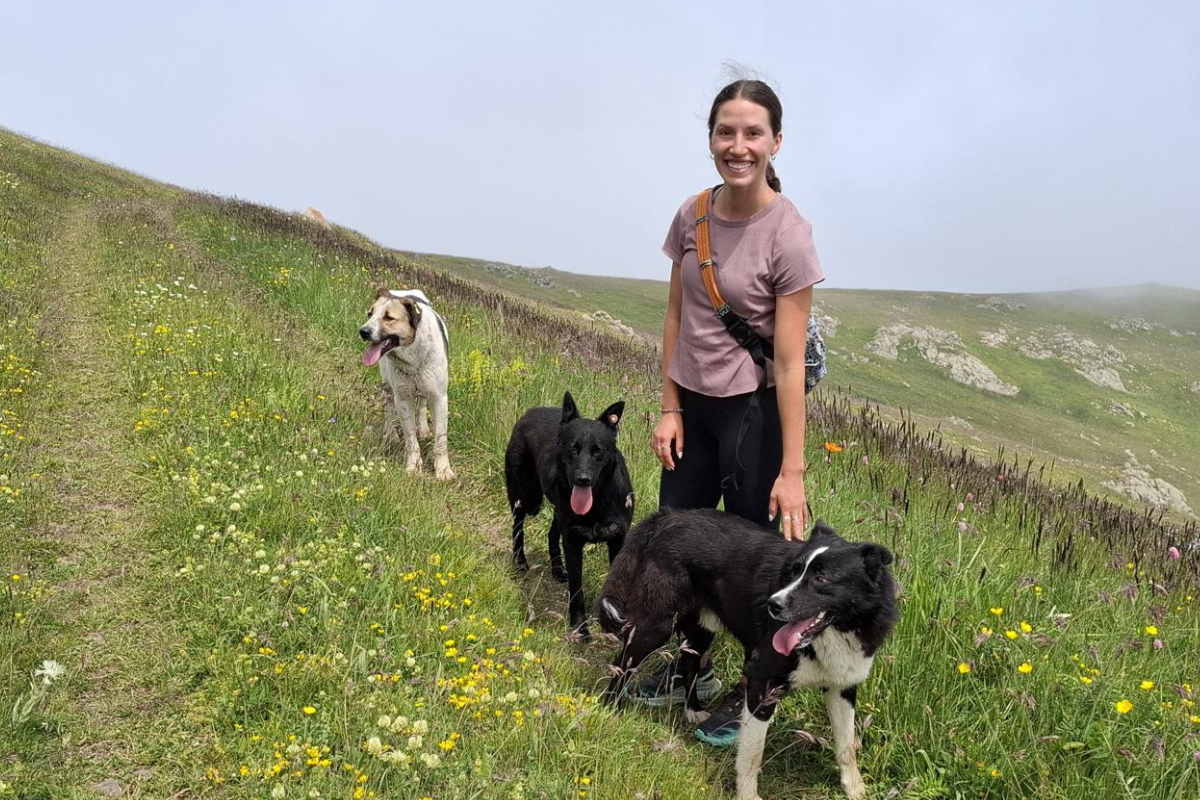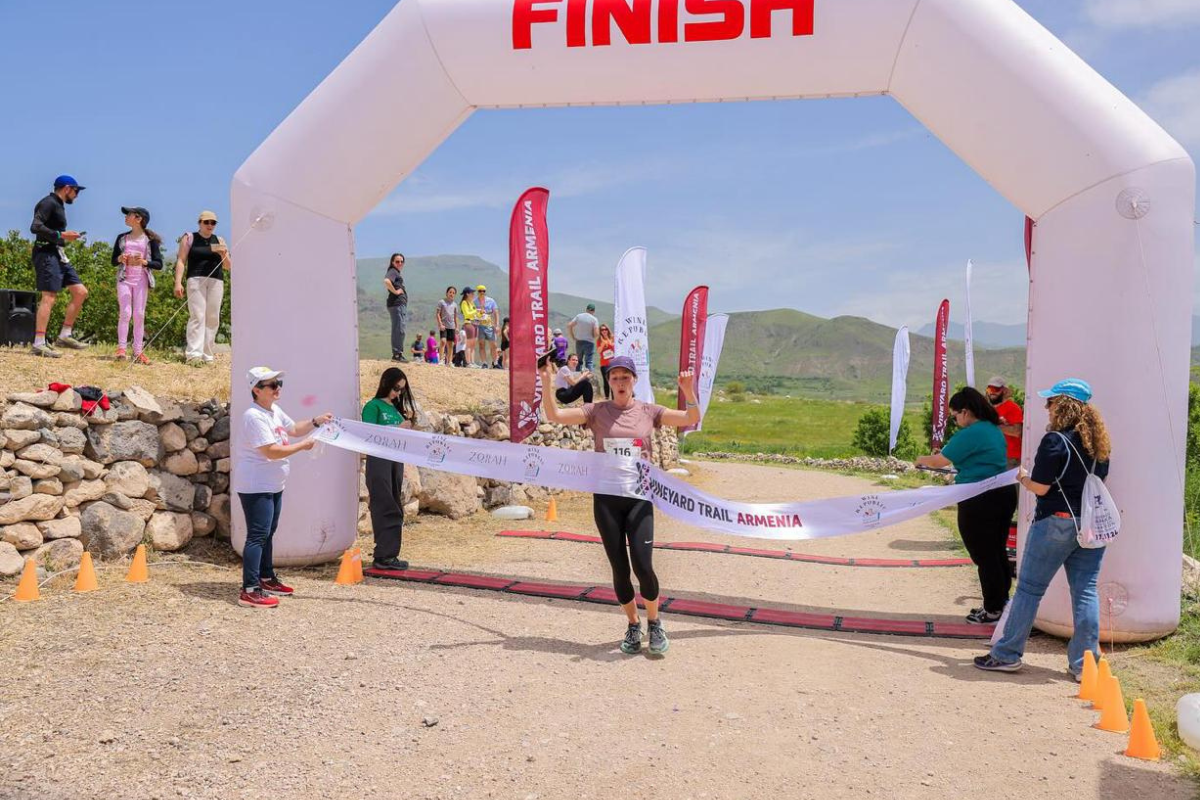Publications
31.08.2025
2 min
Repat Story
“Armenia Gave Me a Life Filled with Meaning”: Sara Stites
-webp(85)-o(png).webp?token=f12629217ff0157c7f4a629edb449824)
An American with Irish and Armenian Roots
My heroine needs no introduction: almost everyone in Armenia knows Sara Stites! She is the initiator and participant of countless social and charitable projects, and she can be seen at nearly every running event in Armenia — often holding the winner’s trophy.
This story is an attempt to show Sara from another side, to tell about her as a woman who, starting almost from zero, reconnected with her Armenian roots.
“From childhood, I knew I had Armenian roots: my maternal grandfather was Armenian, but he passed away long before I was born. In our family, it was said that our Armenian roots disappeared with him. Since he married an Irish woman, my mom and her seven siblings grew up speaking English, knowing only a few Armenian words. I too knew just a handful of words from my grandfather’s language and a few facts about Armenia.
The Armenian community in Washington, where I lived, was very small. I had no contact with Armenians until university, when I first met people with last names ending in ‘-yan.’ That’s how I got to know a girl who was half Armenian. Through her, I first entered Washington’s Armenian community,” Sara begins.
By then, Sara was already working as a journalist. She had done some research on Armenian topics and even written poems about the Armenian Genocide. Around that time, her new Armenian friend invited her to a Christmas party at the community. But in the end, Sara went alone: her friend got sick and couldn’t join. “It was a cold, snowy day. The train ride was long, and I kept wondering if I should go or not. I went, and that’s how I met my first Armenian friends. They told me about Birthright Armenia. Two years later, I came to Armenia.”
From Washington to Gyumri
Arriving in Yerevan, Sara headed straight to the Birthright Armenia office. Even before coming, she had spoken with them by phone, and it was decided that Gyumri would be a great place to experience the “real Armenia.” She was told that the Emili Aregak café would soon be opening, and her marketing skills would be useful there. She was also offered a role at Herbs and Honey. During her first months, Sara worked at both, before moving full-time to Emili Aregak.
“My plan was to spend four months in Gyumri, then go to Yerevan in the winter and to Artsakh in the spring. But I fell so deeply in love with Emili Aregak that I never left Gyumri,” she continues.
Sara spent a full year volunteering in Gyumri, as she had originally planned. Having mostly Irish heritage, she had once lived in Ireland, and wanted to recreate that kind of experience in Armenia. After her year of volunteering, she went back to the U.S. for a wedding and took time to think: did she want to move to Armenia permanently? In October 2019, Sara returned to Gyumri, accepted a job at Emili Aregak, rented an apartment, and began applying for Armenian citizenship.

In just a few years, she learned Armenian and now speaks it fluently, though she modestly admits her pronunciation isn’t perfect: “It makes me sad to meet people who have lived here for ten years and still don’t speak Armenian. Speaking the local language, even at a basic level, is a sign of respect if you’ve decided to live here.”
Work at “Emili Aregak”
Sara made an invaluable contribution to the Emili Aregak day center for children with disabilities and its café in Gyumri. She joined in 2018, before the café opened, stood by it during the pandemic, and continues to help it thrive.
“Before coming to Armenia, I had experience working on disability-related projects. At Emili Aregak, I saw how different conditions are for people with disabilities in Washington versus Armenia. Not just the physical conditions, but also society’s attitudes.
Many people invited me into their homes, and I saw children with disabilities living in high-rise buildings without elevators, without transport access. And then I saw how life changed for those children at our center — where everything was accessible, therapists were available, and stereotypes disappeared. That’s when I felt shame for how society treats children with disabilities. Things are better now, but challenges remain. Some parents didn’t want to bring their children, afraid of gossip. We need to teach society that disability doesn’t mean being contagious. These people have dignity. It was incredibly hard to live in that mentality, but I realized that everything is possible when there is love and commitment.”
When the pandemic hit in 2020, the café could only function as a bakery. Sales were low, and salaries couldn’t be paid. From the start, the café had employed youth with disabilities and their mothers, for whom the job was a lifeline. A repatriate named Petros stepped in: at the end of each day, he bought all the leftover baked goods and asked for them to be given to families in need. That idea sparked a donor campaign that, with contributions from hundreds of people worldwide, kept everyone employed.
One of the major donors to this campaign was the Ayo platform of the Fund for Armenian Relief — where Sara is now the director.
“Emili Aregak is my heart and the reason I stayed in Armenia,” says Sara. Her work at Ayo continues to support Emili Aregak.
The Work of AYO
“In 12 years, the platform has funded about 95 programs in the regions of Armenia and in Artsakh. Our philosophy is that you don’t need to be rich to make an impact. Everyone can contribute to Armenia’s development. We have donors in 35 countries, including those who donate their birthdays and weddings. For example, a 7-year-old boy, the son of Armenian parents, gifted his birthday and raised $6,500 for a program helping children with asthma.
Now we have seven active programs: we’re preparing an exhibition for people with vision problems, we’re trying to equip clinics in Syunik and Chambarak, and for Aregak we’re providing a year of psychological support for children and their parents. This year, our platform will be the main charity partner of the Yerevan Marathon,” Sara explains.

The Biggest Challenge
Throughout our conversation, Sara’s bright smile never left her face — the same smile I remembered from our hikes together. But as she admits, in Gyumri, such a smile is often misunderstood. “A girl smiling without reason” isn’t always well received. This became the biggest challenge of her Armenian journey: how to be herself, yet adapt a little to society?
“I know the real Sara always smiles, but now there are two of me. Where I feel vulnerable, I try to stay neutral; with my people, I smile. Fortunately, I have that option, and sometimes I take it with humor. Society always wants you to change; I’ve found this balance — otherwise, I’d be betraying myself.”

A Life Filled with Meaning
Sara has lived in Gyumri for seven years. Her work at Ayo also requires her presence in Yerevan, so she spends part of the week in the capital at a friend’s place and part at her own home in Gyumri. She’s also an avid runner who competes in various races and donates all her prize money to Emili Aregak. She often initiates such events herself and goes hiking, too. An active life and frequent trips — that’s her.

“My biggest dream is the de-urbanization of Yerevan, and I try to show by example that you can live a full life in the regions. Especially for repatriates, there are great opportunities here. People ask me: what do you do in Gyumri after Washington? I tell them I have no free time! Many in Gyumri say they’ll leave at the first chance, but my example and that of others makes them look at their city differently and fall in love with it again.”
Sara admits that in the U.S., she was constantly running — chasing success and luck. But what is success? A big house, a high salary? Many people have those, but no joy.
Arriving in Yerevan, Sara headed straight to the Birthright Armenia office. Even before coming, she had spoken with them by phone, and it was decided that Gyumri would be a great place to experience the “real Armenia.” She was told that the Emili Aregak café would soon be opening, and her marketing skills would be useful there. She was also offered a role at Herbs and Honey. During her first months, Sara worked at both, before moving full-time to Emili Aregak.
“My plan was to spend four months in Gyumri, then go to Yerevan in the winter and to Artsakh in the spring. But I fell so deeply in love with Emili Aregak that I never left Gyumri,” she continues.
Sara spent a full year volunteering in Gyumri, as she had originally planned. Having mostly Irish heritage, she had once lived in Ireland, and wanted to recreate that kind of experience in Armenia. After her year of volunteering, she went back to the U.S. for a wedding and took time to think: did she want to move to Armenia permanently? In October 2019, Sara returned to Gyumri, accepted a job at Emili Aregak, rented an apartment, and began applying for Armenian citizenship.

In just a few years, she learned Armenian and now speaks it fluently, though she modestly admits her pronunciation isn’t perfect: “It makes me sad to meet people who have lived here for ten years and still don’t speak Armenian. Speaking the local language, even at a basic level, is a sign of respect if you’ve decided to live here.”
Work at “Emili Aregak”
Sara made an invaluable contribution to the Emili Aregak day center for children with disabilities and its café in Gyumri. She joined in 2018, before the café opened, stood by it during the pandemic, and continues to help it thrive.
“Before coming to Armenia, I had experience working on disability-related projects. At Emili Aregak, I saw how different conditions are for people with disabilities in Washington versus Armenia. Not just the physical conditions, but also society’s attitudes.
Many people invited me into their homes, and I saw children with disabilities living in high-rise buildings without elevators, without transport access. And then I saw how life changed for those children at our center — where everything was accessible, therapists were available, and stereotypes disappeared. That’s when I felt shame for how society treats children with disabilities. Things are better now, but challenges remain. Some parents didn’t want to bring their children, afraid of gossip. We need to teach society that disability doesn’t mean being contagious. These people have dignity. It was incredibly hard to live in that mentality, but I realized that everything is possible when there is love and commitment.”
When the pandemic hit in 2020, the café could only function as a bakery. Sales were low, and salaries couldn’t be paid. From the start, the café had employed youth with disabilities and their mothers, for whom the job was a lifeline. A repatriate named Petros stepped in: at the end of each day, he bought all the leftover baked goods and asked for them to be given to families in need. That idea sparked a donor campaign that, with contributions from hundreds of people worldwide, kept everyone employed.
One of the major donors to this campaign was the Ayo platform of the Fund for Armenian Relief — where Sara is now the director.
“Emili Aregak is my heart and the reason I stayed in Armenia,” says Sara. Her work at Ayo continues to support Emili Aregak.
The Work of AYO
“In 12 years, the platform has funded about 95 programs in the regions of Armenia and in Artsakh. Our philosophy is that you don’t need to be rich to make an impact. Everyone can contribute to Armenia’s development. We have donors in 35 countries, including those who donate their birthdays and weddings. For example, a 7-year-old boy, the son of Armenian parents, gifted his birthday and raised $6,500 for a program helping children with asthma.
Now we have seven active programs: we’re preparing an exhibition for people with vision problems, we’re trying to equip clinics in Syunik and Chambarak, and for Aregak we’re providing a year of psychological support for children and their parents. This year, our platform will be the main charity partner of the Yerevan Marathon,” Sara explains.

The Biggest Challenge
Throughout our conversation, Sara’s bright smile never left her face — the same smile I remembered from our hikes together. But as she admits, in Gyumri, such a smile is often misunderstood. “A girl smiling without reason” isn’t always well received. This became the biggest challenge of her Armenian journey: how to be herself, yet adapt a little to society?
“I know the real Sara always smiles, but now there are two of me. Where I feel vulnerable, I try to stay neutral; with my people, I smile. Fortunately, I have that option, and sometimes I take it with humor. Society always wants you to change; I’ve found this balance — otherwise, I’d be betraying myself.”

A Life Filled with Meaning
Sara has lived in Gyumri for seven years. Her work at Ayo also requires her presence in Yerevan, so she spends part of the week in the capital at a friend’s place and part at her own home in Gyumri. She’s also an avid runner who competes in various races and donates all her prize money to Emili Aregak. She often initiates such events herself and goes hiking, too. An active life and frequent trips — that’s her.

“My biggest dream is the de-urbanization of Yerevan, and I try to show by example that you can live a full life in the regions. Especially for repatriates, there are great opportunities here. People ask me: what do you do in Gyumri after Washington? I tell them I have no free time! Many in Gyumri say they’ll leave at the first chance, but my example and that of others makes them look at their city differently and fall in love with it again.”
Sara admits that in the U.S., she was constantly running — chasing success and luck. But what is success? A big house, a high salary? Many people have those, but no joy.
“Success looks different for everyone. Some think it’s a fancy job, a big paycheck, or the impression they make when they walk into a room. Each person must decide what success means to them. I realized my role could be as a bridge between Armenia and the Armenian diaspora in the U.S., showing them how to help. In this sense, Armenia gave me a life filled with meaning.”
By Nare Bejanyan
Translation via AI based on the original Russian article: «Армения дала мне жизнь, наполненную смыслом»: Сара Стайтс .
-
News
-webp(85)-o(png).webp?token=4db0fc384e15fdc1fa40160b6a6ca215) 02.02.2026Is It Possible to Open a Bank Card in Armenia Remotely if You Are a Non-Resident?
02.02.2026Is It Possible to Open a Bank Card in Armenia Remotely if You Are a Non-Resident?

-webp(85)-o(png).webp?token=d3baa4e5a66d58d4e86e61808a50c13c)
-webp(85)-o(png).webp?token=0f42b0b6495e56f8d4c718a8194ddb85)